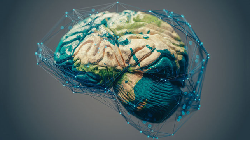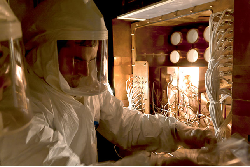April 2018 Ideas and Innovation
Read the articles selected in April 2018
With €1.5 billion for artificial intelligence research, Europe pins hopes on ethics
By Tania Rabesandratana
Source: Science, 25 April

Europe challenges the Chinese and American competitors with a plan on artificial intelligence which intends to bring further the boundaries of the knowledge ensuring an ethical benchmark through an AI model based on the privacy, transparency, and fairness.
Read more:
Marsquakes set to reveal tantalizing clues to planet’s early years
By Alexandra Witze
Source: Nature, 26 April

A seismometer put on the Martian surface will capture the planet’s inner tremors known as marsquakes to understand its inner structure, density, and composition. Pinning down the planet’s internal layers might shed light on the early history of the Earth.
Read more:
https://www.nature.com/articles/d41586-018-04964-x
Researchers make plastic-eating mutant enzyme better –by accident
By Damian Carrington
Source: The Guardian Domestic, 17 April
An accidental discovery will make possible to recycle plastic bottles back into plastic for food, reducing the amount of PET in the environment. The research paves the way to the technological development of super-enzymes, but a full life-cycle assessment will be always needed.
When big data can bring big gains to society
By Sonia Sodha
Source: The Observer Domestic, 22 April
In a time when data privacy has become a priority matter of law, sharing the own health records can become a game changer, enabling researchers to develop new treatments for important diseases. But our concerns about our personal rights change asymmetrically in relation to big companies and health national systems.
Les pistes de Cédric Villani pour combler le retard français
Source: Le Figaro, 29 March
The Villani report on AI affirms the need to create a European specific model and strategy in the sector, highlighting the role the public institutions and an ethical education have for a responsible data processing and endorsing the creation of a shared and open source of data and sectorial platforms for the exchange of information.
Rapport Villani: qu’en pensent les experts?
By Benoît Georges
Source: Les Echos, 10 April
The weakest points of the Villani report, pinpointed by seven experts, highlight the need to not emphasize the ethical issues, leaving more room to the entrepreneurial actors in order to facilitate the creation of value and jobs, as well as investing on a network of interdisciplinary institutes on artificial intelligence.
Do adult human brains renew their neurons?
Source: The Economist, 12 April

Two studies published respectively in Nature and Cell Stem Cell draw on contradictory conclusions on the possibility of neurogenesis in adulthood. Although both the experiments have used the same technique, different procedures in the inspection of post-mortem brain samples could explain the opposite results.
Read more:
“Warm transplants” save livers and lives
By Elie Dolgin
Source: Nature, 18 April

A device already approved in Europe but still not routinely used outside of clinical trials allows to maintaining livers for transplants at body temperature with a treatment which can reduce the risk of degeneration and could increase the number of transplants, opening the door to further treatment of donor organs.
Consulta l’articolo:
https://www.nature.com/articles/d41586-018-04816-8
Quand l’environnment influence les gènes
By Sylvie Logean
Source: Le Temps, 7 April
In the last twenty years, the discovery of the epigenetics has shown the impact of the lifestyle and the environmental conditions in the DNA expression. The epigenetic modifications, the fundament of biological diversity, are critical factors in the breakout of many diseases.
Intelligence artificielle: en finir avec les mirages
By Vincent Champain
Source: Les Echos, 9 April
When we speak about artificial intelligence we should name things after their real meaning, avoiding terms that leave free room for prophetic fantasies. The capacity of these technologies is limited to well-defined tasks and can’t replace the human intelligence.
Les trois visages de l’intelligence artificielle
By Luc Ferry
Source: Le Figaro, 5 April
The human brain can’t be compared to artificial intelligence under any point of view. Even in its “super” and contextualizing version, its performance is only vertical, while the self-consciousness of the “strong” IA is always lacking a body and therefore feelings.
Demand cancer drugs that truly help patients
di Ajay Aggarwal
Fonte: Nature, 10 Aprile
La maggior parte dei farmaci sono approvati dalle agenzie regolatrici senza una chiara evidenza di una migliore sopravvivenza o qualità della vita e di una ridotta tossicità. Un basso livello di controllo sui trials toglie terreno all’innovazione e spreca denaro.
Consulta l’articolo:
https://www.nature.com/articles/d41586-018-04154-9
Study questions animal data underlying many clinical trials
By Emma Yasinski
Source: Science, 5 April

A new study reveals that the investigator brochures produced by researchers to get the authorization for a clinical trial based on animal data don’t give sufficient evidence to allow regulatory and ethical agencies to make a sound judgment about the drugs’ safety and benefit for human health.
Read more:
People must retain control of autonomous vehicles
By Ashley Nunes, Bryan Reiner & Joseph F. Coughlin
Source: Nature, 6 April
Developers of self-driving cars are not obliged to meet the safety standards of current cars. It is needed a legislation designed through a collaboration across many disciplines. Favoring the industry over consumers erodes support for the technology.
Read more:
https://www.nature.com/articles/d41586-018-04158-5
Beijing launches pioneering brain-science center
By David Cyranoski
Source: Scientific American, 6 April
The brain science-center just launched in China will be the structure for projects that use the most innovative biomedical methods as well the big data, and plans to develop more precise imaging tools to deliver detailed views of brain activity.
Read more:
https://www.scientificamerican.com/article/beijing-launches-pioneering-brain-science-center/
NASA’s next exoplanet hunter will seek worlds close to home
By Alexandra Witze
Source: Nature, 4 April
NASA’s Transiting Exoplanet Survey Satellite, differently than its predecessor Kepler, will find fewer planets, but with a more focused approach. This new mission is interested in planets orbiting around nearby stars, and so close to form the basis for deep studies and important discoveries.
Read more:
https://www.nature.com/articles/d41586-018-03354-7
La blockchain peut-elle révolutionner le droit d’auteur?
By Raphaël Bloch
Source: Les Echos, 20 March
The Bitcoin technology is going to revolutionize the copyright and the cultural industry. Thanks to its capacity to record transactions and protect data in a transparent and indisputable manner, blockchain blocks the abusive exploitation of the works on the net and allows a direct contractual relationship between the artist and the consumer.
Beguiling dark-matter signal persists 20 years on
By Davide Castelvecchi
Source: Nature, 28 March

Rita Bernabei, a physicist at our university has presented at a meeting in Gran Sasso National Laboratory the latest data from an experiment called DAMA, which has been trying for 20 years to detect the presence of dark matter, with results that haven’t so far been achieved by every other finding in the sector.
Read more:
https://www.nature.com/articles/d41586-018-03991-y
La technologie au chevet de la vaccination
By Nadia Fourti
Source: Le Temps, 29 March
The digital technologies can improve the efficacy of vaccinations, whether through the registration of personal data, which is crucial for the coverage of all children or through monitoring tools for the cooling chain. This could save the lives of 1.5 million children every day.
Interested in responsible gene editing? Join the (new) club
By Martin Enserink
Source: Science, 27 March

A group of European scientists has founded in Paris the Association for Responsible Research and Innovation in Genome Editing (ARRIGE), with the aim to promote an ethical awareness on this so pervasive technique and to set a social dialogue needed to guide national and European legislation.
Read more:
Info
- Pubblicato il : 07/05/2018 Modificato il : 04/04/2019
Allegati
- When big data can bring big gains to society pdf
- Researchers make plastic eating mutant enzyme better by accident pdf
- Rapport Villani: qu'en pensent les experts? pdf
- Le rapport Villani pdf
- Les trois visages de l'intelligence artificielle pdf
- Intelligence artificielle: en finir avec les mirages pdf
- Quand l'environnement influence les gènes pdf
- La technologie au chevet de la vaccination pdf
- La blockchain peut révolutionner le droit d'auteur pdf

